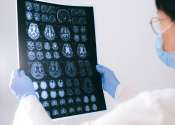Last update:
Health informatics news
Cardiology
Stroke guidelines updated, with focus on women and GLP-1s
Women, especially those who had high blood pressure during pregnancy or entered menopause before age 45, are among those with a greater risk for stroke.
2 hours ago
0
0
Parkinson's & Movement disorders
Network theory insights lead to a mathematical representation of Parkinson's disease
Neurodegenerative diseases, such as Parkinson's disease, can be thought of as arising from malfunctions in the network of neuronal agglomerates in the brain. It is therefore often useful to apply insights from a branch of ...
Nov 22, 2024
0
1
Cardiology collaboration advances machine learning predictions for AFib after stroke
Researchers at Penn State are using machine learning and existing electrocardiogram (ECG) data to help doctors make more accurate predictions. A team of artificial intelligence engineers, in collaboration with a team of physicians ...
Nov 22, 2024
0
4

Improving the enunciation of speech-to-text technology in medical settings
Speech-to-text programs are becoming more popular for everyday tasks like hands-free dictation, helping people who are visually impaired, and transcribing speech for those who are hard of hearing. These tools have many uses, ...
Nov 22, 2024
0
0

Global research team develops H5N1 detection kit to tackle avian flu
The Diagnostics Development Hub (DxD Hub), a national platform hosted by the Agency for Science, Technology and Research (A*STAR), Singapore, in collaboration with the National Institute for Environmental Studies (NIES), ...
Nov 22, 2024
0
0

Using artificial intelligence to personalize infection treatment and address antimicrobial resistance
New research from the Centers for Antimicrobial Optimization Network (CAMO-Net) at the University of Liverpool has shown that using artificial intelligence (AI) can improve how we treat urinary tract infections (UTIs), and ...
Nov 21, 2024
0
2

AI method can measure cancer severity using pathology reports to shorten selection process for clinical trials
A group of investigators led by Cedars-Sinai have developed and successfully tested a new artificial intelligence (AI) method to make launching cancer clinical trials easier and faster. The method uses patients' pathology ...
Nov 21, 2024
0
2

Q&A: Promises and perils of AI in medicine, according to experts in public health and AI
In most doctors' offices these days, you'll find a pattern: Everybody's Googling, all the time. Physicians search for clues to a diagnosis, or for reminders of the best treatment plans. Patients scour WebMD, tapping in their ...
Nov 21, 2024
0
0

Algorithm can identify subtle changes in a person's voice for early Parkinson's detection
Algorithms that can detect subtle changes in a person's voice are emerging as a potential new diagnostic tool for Parkinson's disease, according to researchers from Iraq and Australia.
Nov 21, 2024
0
1

New research highlights AI's potential and pitfalls in scouring health data
Institute for Systems Biology (ISB) researchers have gained new insights into the strengths and limitations of using artificial intelligence (AI) to identify social determinants of health from electronic health records. Their ...
Nov 21, 2024
0
0

Data mining reveals patterns in brain's reactions to good and bad smells
Seeking to shed light on inconsistent brain activation patterns observed in previous studies of smell, a team of researchers in Lyon, France, used data mining techniques to analyze the pleasant or unpleasant odor sensations ...
Nov 21, 2024
0
0

Study explores public health themes in print and website versions of legacy media
A recent study by Assistant Professor Ann Gaba and MPH student Richard Bennett described the development of a data set for content analysis of public health discussions in print and website versions of legacy media.
Nov 21, 2024
0
0

Study of menstrual tracking app usage highlights potential role in improving access to reproductive health services
A new study by researchers in the UK and Denmark, published in Digital Health, provides the first publicly accessible analysis of global downloads for menstrual tracking apps.
Nov 21, 2024
0
0

Dementia risk prediction: Zero-minute assessment at less than a dollar cost
A new study by researchers from Regenstrief Institute, Indiana University and Purdue University presents their low cost, scalable methodology for the early identification of individuals at risk of developing dementia. While ...
Nov 20, 2024
0
3

AI model can diagnose depression via speech and brain neural activity
Depression is one of the most common mental illnesses. As many as 280 million people worldwide are affected by this disease, which is why researchers at Kaunas University of Technology (KTU) have developed an artificial intelligence ...
Nov 20, 2024
0
0

Bayesian metamodeling provides insight into how T cells are activated
A research team behind a new study at the Hebrew University of Jerusalem has made an important breakthrough in understanding how immune cells known as T cells are activated.
Nov 20, 2024
0
0

AI enhances early detection of pancreatic cysts
When it comes to early detection of silent but deadly diseases like pancreatic cancer, finding it early and predicting disease aggressiveness are critical for increasing long-term survival.
Nov 20, 2024
0
1

New AI tool offers insights to improve safety for mothers and babies in maternity care
Loughborough University researchers have developed an artificial intelligence (AI) tool that identifies the key human factors influencing maternity care outcomes, supporting ongoing efforts to improve safety for mothers and ...
Nov 20, 2024
0
0

Study highlights feasibility of cranial accelerometry device for prehospital detection of large-vessel occlusion stroke
A new study exploring the use of cranial accelerometry (CA) headsets for the prehospital detection of large-vessel occlusion (LVO) strokes has been published in Academic Emergency Medicine.
Nov 20, 2024
0
0

Students develop AI model for middle ear disease detection
Understanding the middle ear is essential—not only for hearing but also for balance and quality of life. According to the National Institutes of Health, in the U.S., one in eight adults has hearing loss, and nearly 28% ...
Nov 20, 2024
0
0

Report addresses responsible use of race and ethnicity in biomedical research
A report released from the National Academies of Sciences, Engineering, and Medicine Health and Medicine Division addresses the responsible use of race and ethnicity in biomedical research and is a call to action for biomedical ...
Nov 20, 2024
0
0

Toward the international unification of drug-drug interaction information
Drug-drug interaction (DDI) is a phenomenon in which the efficacy of a drug is weakened or enhanced when multiple drugs are combined. The DI can cause serious health risks to patients.
Nov 20, 2024
0
0

AI analysis of urine can predict flare up of lung disease a week in advance
Researchers have used artificial intelligence (AI) to analyze patient urine samples and predict when symptoms of chronic obstructive pulmonary disease (COPD) will flare up, according to a study published in ERJ Open Research.
Nov 20, 2024
0
0

Radiologists could soon be using AI to detect brain tumors
A paper titled "Deep Learning and Transfer Learning for Brain Tumor Detection and Classification" published in Biology Methods and Protocols shows that scientists can train artificial intelligence (AI) models to distinguish ...
Nov 19, 2024
0
38

Predicting mood episodes using wearable devices: A sleep and circadian rhythm data analysis model
The research team led by Chief Investigator Kim Jae Kyoung (IBS Biomedical Mathematics Group, and Professor at KAIST) and Professor Lee Heon-Jeong (Korea University College of Medicine) has developed a novel model that can ...
Nov 19, 2024
0
39













































